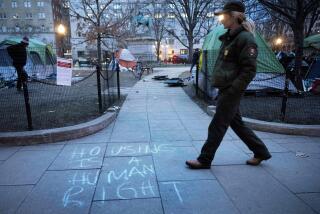NEWS ANALYSIS : Washington’s Experts Seem Powerless to Aid Own City : Government: They are more likely to help foreign countries than the District of Columbia, a longtime resident says. Nor are they asked to help stem the poverty and crime that surrounds them.
- Share via
WASHINGTON — Washington, awash with problem-solvers, is a city awash with problems.
Washington sends experts to Warsaw to prop up the zloty and to Tirane to teach democracy to Albanians. It swarms with criminologists, city planners, lawyers, lobbyists, journalists, medical researchers, educators, executives, administrators, consultants, “facilitators.”
It is home to government and monuments and seven full-blown universities, including one that graduated the occupant of the White House.
But the Washington that’s community to 607,000 people is in trouble, and all that talent here isn’t helping. Nor is it asked to help.
It is a bit strange.
Community Washington is in trouble the way many of the country’s big cities are in trouble--the middle class is fleeing, leaving behind a city of the comfortably rich and the more numerous, uncomfortably poor.
And it is in trouble in ways particular to this city. Washington has only quasi self-government. It has an overseer. Congress can veto any law the City Council passes.
Half the real estate is exempt from property taxes. On top of that, the city is barred from taxing commuters--people who live in Maryland or Virginia, but work here and benefit from city services. City officials tend to blame some of their troubles on that.
Those troubles are legion. No place in America comes close to equaling Washington’s murder rate. The city averages better than one killing a day.
In virtually every other category used as a warning flare--infant deaths, drug use, high school dropouts--Washington is among the leaders. The Washington Post says 42% of the city’s black male population is in prison or jail, on probation or parole or being sought on an arrest warrant.
What’s more, the city is broke and may have to turn to the federal Establishment for a bailout that would not come without a further loss of independence and self-rule.
Bill Clinton is simpatico to the city. He has made himself a Washingtonian. He jogs the city’s streets and visits its restaurants.
When Mayor Sharon Pratt Kelly, at wit’s end about crime, asked him for permission to call out the National Guard, Clinton gave her a sympathetic listening and a gentle turndown. He had no real choice. Any other answer would have made Washington seem as lawless as Mogadishu and would have embarrassed the country.
Clinton, graduate of Georgetown University, is like so many other important people who come to town with a new Administration: fairly inactive about the city’s down-home problems.
In Cleveland or Louisville, the community’s leaders--its businessmen and other solid citizens--get involved when their community is in trouble. Not here.
Here, the child health expert who lives down the street knows more about infant mortality on Indian reservations than in Anacostia, an especially poor and isolated Washington neighborhood. The international economist who works downtown for the World Bank knows more about the deficit in Belarus than in the city.
Part of the reason is that residency in Washington is often temporary duty. After a tour here, many will go home.
There is a racial element too. Washington is a proud predominantly black city, with a strong black middle class, a black history and a black culture. Almost all its city officials are black.
The newcomers--the government people--are predominantly white. They may think it would seem patronizing to offer Washington their advice and attention.
Moreover, to a prosperous person living in a prosperous neighborhood, Washington’s problems are easy to ignore. Not only is there a disconnect between the city and some of its brainiest residents, there is a divide between prosperous (and mostly, but not entirely, white) Washington and the rest of the city.
It is a beautiful city, especially in spring, a flowering, blooming place. For the comfortable, it can be a most comfortable place. One can even park without much trouble. The Saturday morning sound is not the rat-tat-tat of an automatic gun; it is the World Bank economist, mowing his lawn.
Still, Washington has desperate problems. That is this city’s dirty little secret--secret even from some of its most powerful residents.
Mike Feinsilber, a resident for 26 years, reports on events in Washington for the Associated Press.
More to Read
Sign up for Essential California
The most important California stories and recommendations in your inbox every morning.
You may occasionally receive promotional content from the Los Angeles Times.












